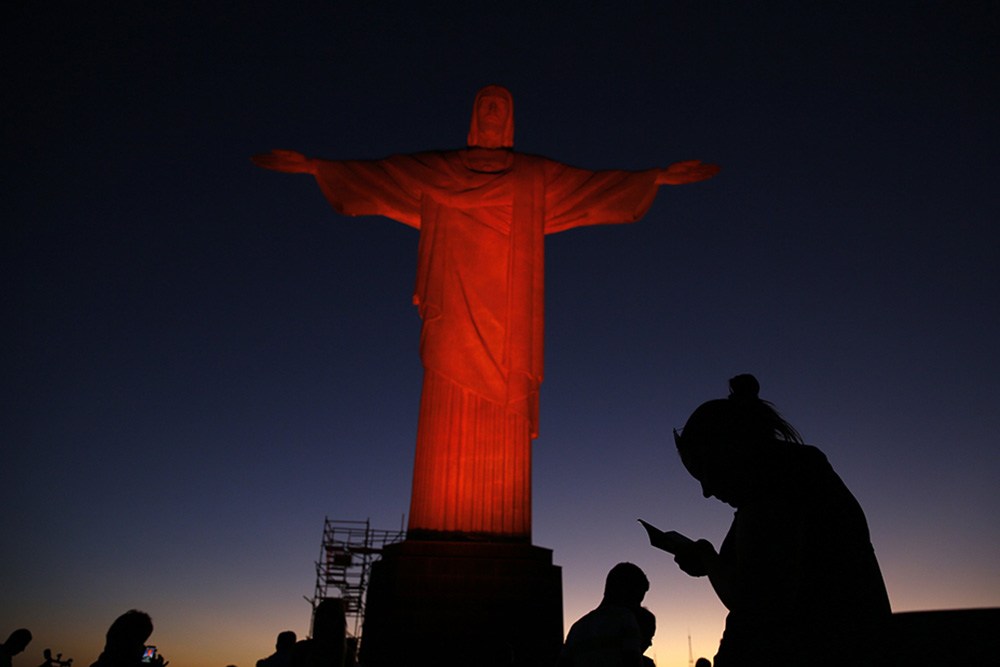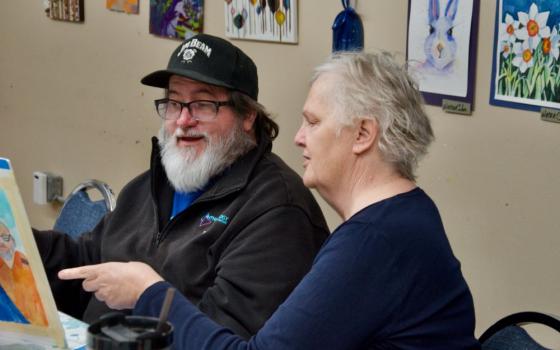
People are pictured in a file photo standing in front of the statue of Christ the Redeemer in Rio de Janeiro as it is lit up in orange to commemorate the Day against Human Trafficking and Missing Persons observed by the Archdiocese of Rio de Janeiro. (OSV News/Reuters/Pilar Olivares)
As the nation marks National Human Trafficking Awareness Day Jan. 11, women religious in the U.S. are combating modern slavery with prayer and education.
The Alliance to End Human Trafficking — whose members include more than 100 congregations of Catholic women religious — has created a dedicated webpage featuring a prayer service and tool kit for the national observance, which was established by Congress in 2007.
On the same day, the organization launches a daily prayer series on social media leading up to the Feb. 8 International Day of Prayer and Awareness Against Human Trafficking, designated as such by the Pontifical Council for Justice and Peace and the International Union of Superiors General.
The international day coincides with the feast of St. Josephine Bakhita. Born under slavery in Sudan, St. Bakhita eventually became a Canossian sister in Italy. Since her canonization by St. John Paul II in 2000, she has become the patron saint of human trafficking survivors.
The Jan. 11 national observance features a "Wear Blue Day" initiative that invites participants to share social media images of themselves wearing blue clothing to signal support for ending human trafficking. The Alliance to End Human Trafficking's staff and members have posted videos to its social media platforms for the campaign, and it is also highlighting an array of resources for countering trafficking.
Advertisement
In 2021 alone, the most recent year reported on, some 50 million individuals worldwide were in a form of modern slavery, according to the United Nations' International Labor Organization.
The two most common types of human trafficking are forced labor (including sex trafficking) and forced marriage.
In 2021, the Washington-based nonprofit Polaris, which operates the U.S. National Human Trafficking Hotline, received more than 10,350 reports involving over 16,550 individual victims — numbers representing "likely only a fraction of the actual problem," according to the organization's website.
During fiscal year 2022, the U.S. Department of Homeland Security opened 1,373 human trafficking investigations, an increase of more than 260 cases over the previous fiscal year.
The State Department's 2023 Trafficking in Persons Report highlighted three key trends in trafficking — an increase in forced labor, a rise in the use of online scams to target victims and growing numbers of boys and men among those trafficked.
At the same time, "in the last year or so, there's more of a conversation around sex trafficking" and human trafficking in general, said Sister of St. Joseph Meaghan Patterson, a social worker and executive director of Dawn's Place, which is part of the alliance and Philadelphia's first residential recovery program for women who have been sex trafficked.
Patterson told OSV News the 2023 film "Sound of Freedom," which dramatizes the independent work of former Homeland Security agent Tim Ballard in rescuing trafficked children, "really sparked a lot of those discussions."
However, she cautioned, "it's critical that people like us — who are doing the work every day — present the reality and facts of sex trafficking, and not the Hollywood glorified version of it."
Patterson said that trafficking often takes place undetected, but in plain sight.
"A lot of our women are trafficked or exploited by someone they know," such as "a boyfriend, parent, uncle or cousin — someone they have a connection with," she said, adding that "traffickers tend to prey on vulnerabilities" in their victims.
From a national perspective, "we need to do a better job" at both preventing trafficking and supporting survivors, she said.
With sex trafficking, "there's so much stigma that is still attached to particularly prostitution," she said. "We (say), 'They're prostitutes,' instead of saying, 'They're being prostituted.' "
Legalized prostitution, which exists in certain parts of Nevada, and the exponential growth of the multibillion-dollar pornography industry, have "absolutely" worsened the problem of trafficking, she said.
Despite the scope of the problem, Catholic faithful can make a positive impact, said Patterson.
"The number one thing you can do is pray," she said. "There is a huge power in prayer. ... Our retired sisters (are) a powerhouse of prayer.
"Not everyone is going to be able to volunteer or work at Dawn's Place, or have direct contact with survivors of sex trafficking, but they can pray for survivors," she added. "They can pray for those inflicting the pain, and they can pray for those of us working with survivors."




